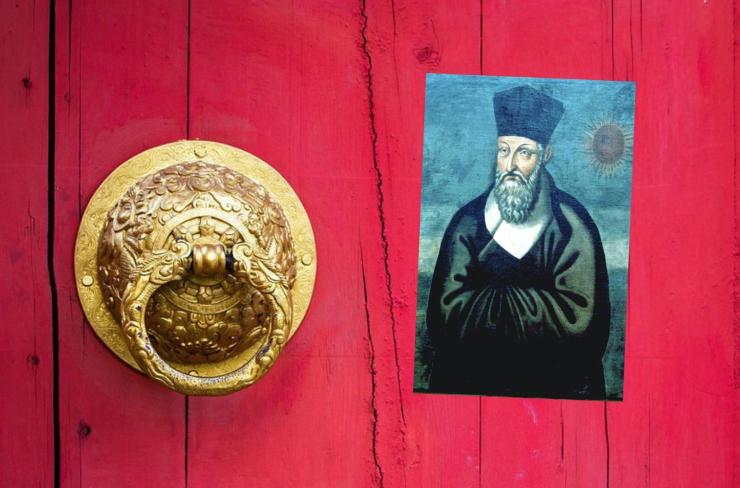China. Matteo Ricci: the Dialogue of Friendship with the Celestial Empire.

The father of the Chinese Church has been declared venerable by Pope Francis. The great Jesuit from Macerata (Italy) brought the Gospel to China through friendship and cultural and scientific dialogue.
“For me, China has always been a benchmark of greatness. A great country. But more than a country, a great culture with inexhaustible wisdom. As a child, when I read something about China and this had the ability to inspire admiration in me. I admire China. Later, I delved into Matteo Ricci’s life and saw how that man felt the same thing I felt and in the exact same way – admiration, and how he managed to enter into dialogue with this great culture, with this age-old wisdom”. Words of Pope Francis in an interview with Asia Times (February 2, 2016).

The Great Wall begins in the east at Shanhaiguan in Hebei province and ends at Jiayuguan in Gansu province to the west.
And this was the gift which on 17 December 2022, his 86th birthday, Francis – who never hid that his first desire as a Jesuit was to go on a mission to China – gave to the Church in China and to all those, and there are many, who awaited in hope, an important gift: during the hearing granted to Card. Marcello Semeraro, prefect of the dicastery for the causes of saints, “He authorized the same dicastery to promulgate the decree concerning the heroic virtues of the Servant of God Matteo Ricci, a professed priest of the Society of Jesus; born on October 6, 1552, in Macerata (Italy) and died on May 11, 1610, in Beijing (China)”. The father of the Chinese Church, known in China as Lì Mădòu, a great scientist, the ‘sage of the West’, is therefore ‘Venerable’. (Venerable means that the Catholic Church recognizes the ‘heroic virtues’ of the Jesuit missionary Matteo Ricci. This is a fundamental stage in the road that leads to beatification.)
Matteo Ricci was a pioneer of the encounter between China and Europe. His missionary story can be read as a progressive ‘ascent’ to the capital, Beijing, starting from that first missionary residence in Zhaoqing, near Canton, where on 10 September 1583 he had first set foot in China.

Chinese characters. Matteo Ricci was a pioneer of the encounter between China and Europe. Photo: Pixabay
He reached Beijing on 24 January 1601; he was 48 years old and had been in the country for 18. In the capital of the celestial empire, he had been preceded by his fame as a man of science and letters.
Many doctors and teachers, philosophers and astrologers wanted to meet him. And many Chinese, especially mandarins, accepted the Gospel and asked for baptism.
Welcomed to the forbidden city for his scientific and cultural knowledge, he found confirmation of his method of apostolate which was none other than the missionary strategy of the Jesuits. He was convinced that if the elite, including the emperor and the court, had adhered to Christianity, the entire Chinese people would have converted. The chronicles tell that in the delirium that preceded his death, he spoke of a mission, mentioning the conversion of the emperor who had welcomed him, but who had never agreed to meet him.
Like Paul of Tarsus
There are those who, rightly, have compared Ricci to the missionary Paul of Tarsus. Like the ‘apostle’ Paul, the Jesuit suffered and gave all of himself for the proclamation of the gospel which was his reason for being in China. He created Christian communities, adapting methods and strategies to acquisitions resulting from experience, and so also from errors and failures.
Neither Ricci nor Paolo aimed to baptize the first person they met on their way. Paul even boasts that he does not baptize (see 1 Cor 1:14.17). Rather, they aimed at creating solid, self-sufficient communities of disciples of the Master of Nazareth, capable of expanding by creating opportunities for evangelization. Communities located in urban centres rather than in small communities or in the countryside.

Fan pattern Chinese style handicrafts gift. Photo: Pixabay
Ricci was not spared criticism which even went so far as to reproach him for disguising the religious nature of his mission under the guise of a scientist, and the Christocentric character of Christianity: to speak of God, but not of Christ, who died and rose again. But his only will was to proclaim the gospel starting from Chinese culture. Ricci represents a turning point in the knowledge of China and interreligious dialogue. His example has broken the boundaries between worlds separated by a great distance that he, in his spiritual and cultural journey, tried to bridge through a new way of evangelizing. He had the intuition that in order to carry out his mission, friendship was fundamental, which alone could allow him to fully understand Chinese culture, its customs and traditions. This is how in 1595, after a series of failures that threw him into a state of ‘melancholy’, as he himself pointed out, he decided to write his first book in Chinese (which he had learned perfectly).

Ricci’s grave in Beijing’s Zhalan Cemetery. CC BY-SA 4.0/Markringo
The title says it all: Jiaoyou lun, De Amicitia (Friendship) in which Chinese and Western wisdom intertwine, fully revealing the ideal of cultural communion that he had in mind. De Amicitia was his missionary manifesto.
‘Friendship is in fact a Confucian virtue: the fifth of the five social relationships, but the only one based on freedom – writes sinologist, historian, and theologian Gianni Criveller in AsiaNews. The Christian humanist Ricci appreciated friendship as an evangelical and humanistic value, and it was precisely around this common value that he built a network of friends that allowed him to found Christian communities in five important cities in China’. Ricci’s desire to create a deep friendship with the intellectuals of the Ming dynasty was great. He believed in the existential power of dialogue which transforms the soul of the person, even if it involves suffering, loneliness, and dedication.
Being listened to
Ricci made this radical change in his method after a fifteen-year presence in China, in the mid-1590s. Coming to the difficult choice of changing his clothes (from the dress of Buddhist monks to the silk one of Confucian scholars) and his manners (from a shaved head to a beard and hair down to his ears, but not his nails, as he should have) to live like a man of letters. He abandoned Buddhism to enhance the relationship between Confucianism and Christianity; for him, many passages of the classical Chinese texts were compatible with Christian teaching. This is how he placed himself, day after day, listening to a millenary culture, welcoming it in order to be welcomed in turn
and to be listened to.

“Ricci appreciated friendship as an evangelical and humanistic value”. Photo: Pixabay
A clear example of friendship is that with the great scholar Xú Guāngqĭ who will be baptized with the name of Paul. The bond with Paul was essential, not only to increase his popularity within the court in Beijing but also to reflect on the very importance of the feeling of friendship. The method, today known as inculturation, is absolutely central to understanding how much the feeling of friendship affects the possibility of converting others and, at the same time, of understanding them in a sincere and pure way. It was not easy for Ricci either, always aware of the difficulties of preaching in the celestial empire, convinced that the method required gradualness and prudence (many articles of faith were difficult to accept for those who came from such different traditions) as well as great suffering and humiliation. This strengthened his conviction that shrewd and cautious friendship with the literati was the fundamental key to the dialogue between Christianity and Confucianism. Only by studying the customs of the men of letters, their traditions and their philosophy was it possible to achieve conversion, that is to transform or change the soul of the men of letters.

Venerable Ricci gives hope for the future of the Christian faith in the land of the middle empire. Photo: Pixabay
But Ricci, too, had to change, overturn his own existence and turn towards Chinese traditions, maintaining, in his heart, the idea of reconciliation and dialogue with the other. Inculturation, therefore, is a dream, a vision, in which friendship represents the link between distant worlds, between different men who, following different paths, can reach the same goal. In Beijing, on imperial soil, Ricci was buried at the end of a life that had seen him as a missionary in China for 28 years: the only foreigner to whom the emperor granted this privilege. Today the Jesuit from Macerata, included in China’s high school textbooks, is remembered in the Millennium Museum, together with Marco Polo, as an important foreigner in the country’s history. But Ricci was above all a missionary and the communities he founded have preserved and transmitted the faith and, despite persecutions and difficulties of all kinds, are still present among the people of China. The Catholic faithful of that country knows this well. Venerable Ricci gives hope for the future of the Christian faith in the land of the middle empire. (Open Photo: 123 rf. – Matteo Ricci. The father of the Chinese Church. (Jesuits Archive)
Elio Boscaini



